Covid-19 and the Blessings of Online Zakat in Indonesia
contributed by Amelia Fauzia, 11 June 2020
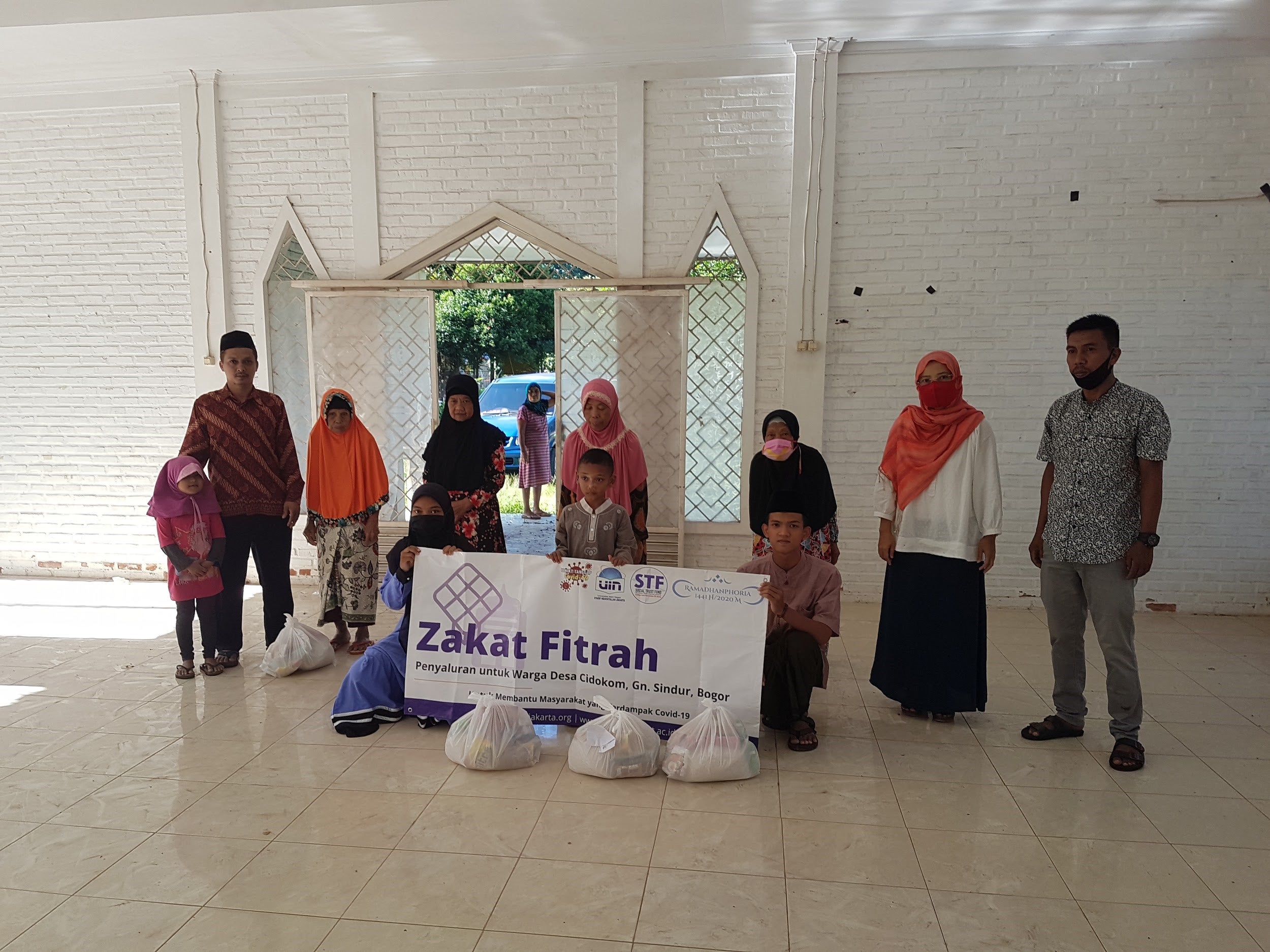
Image: Fitrah distribution from Social Trust Fund UIN Jakarta at Cidokom Bogor. Photo by Amelia Fauziah.
The fasting month of Ramadhan is the time when the majority of Muslims pay zakat, almsgiving. These are of two kinds: zakat fitr—a kind of poll-tax given before the Eid Fitr--and zakat maal, or the payment of about 2.5 percent of one’s wealth once a year, for those eligible. Some give it directly to the poor and needy, and some give to mosques, local zakat collectors or Islamic charity organizations for redistribution. How do they pay it in this Ramadhan (24 April – 23 May 2020), in the middle of the COVID-19 pandemic to which the government responded with large-scale social restrictions--Pembatasan Sosial Berskala Besar (PSBB)--such as urging everyone to work from home, and closing down the mosques?
The increase of zakat and humanitarian donations in pandemic times
The COVID-19 pandemic has caused many deaths, illnesses and loss of income and jobs to millions of vulnerable people. This condition has resulted into a massive humanitarian fundraising in support of the country, including the one managed by Islamic charitable organizations. Despite the distress, the decline of the national economy, and the challenges posed by social distancing, the zakat portrait is not dim.
Islamic charitable organizations (sometimes called zakat organizations) still work to collect zakat, waqf, and many other types of donations to help those in need. Irfan Syauki Beik, Director of Distribution and Utilization for The National Board of Zakat (BAZNAS), a stated-based zakat institution, stated that his institution shows an increase of 56 percent in zakat collection this year compared to Ramadhan last year, and collected more than Rp140 billion (personal interview 28 May 2020).
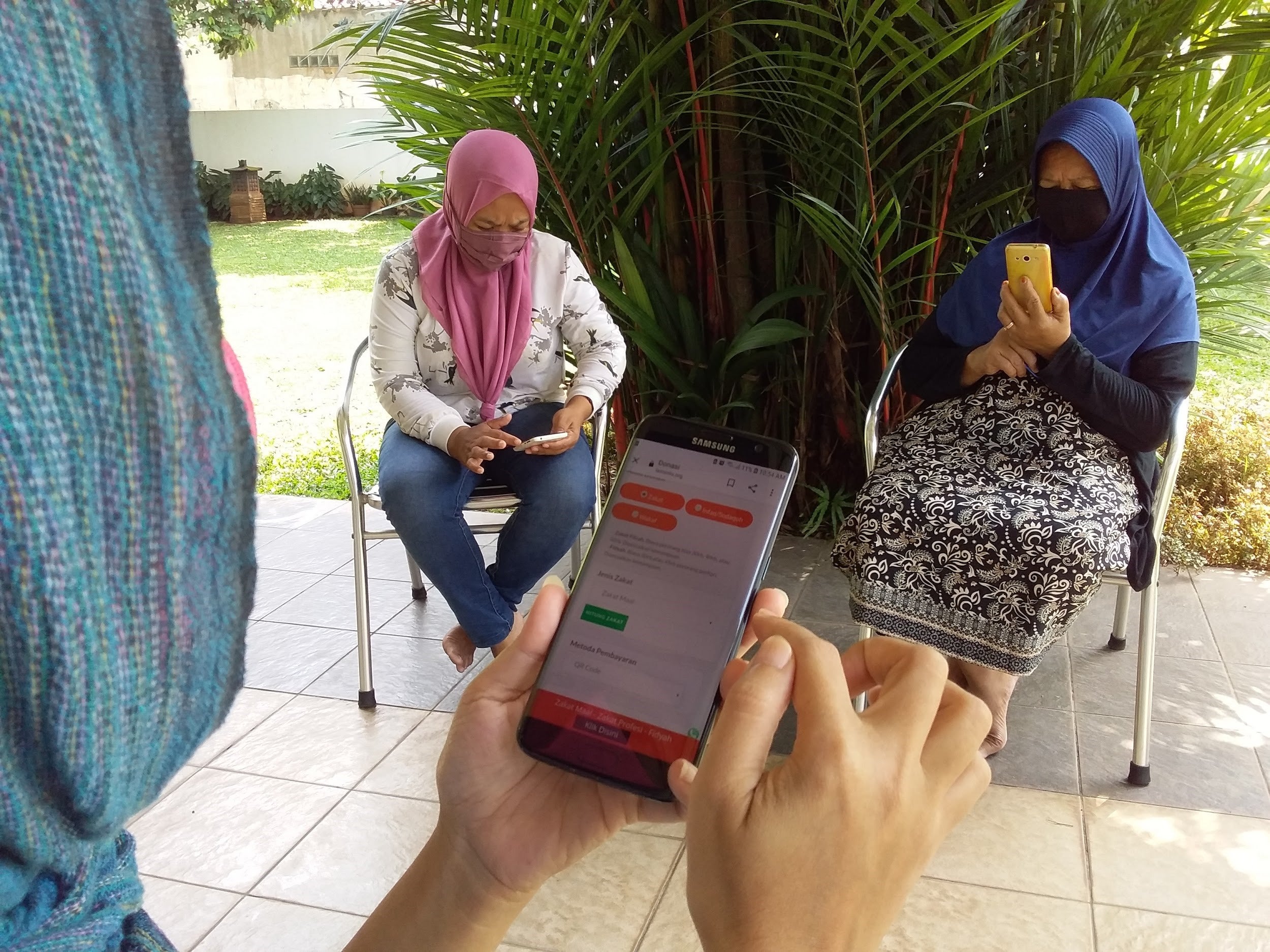
Image: How to pay zakat? Ladies at Cidokom Bogor try to open online zakat service of LAZISMU. Photo by the author.
How about non-state zakat organizations? Mr. Sidik Ansori, Director of Solo Peduli, an Islamic charity organization in Solo, Central Java, explained that his institution received about a 340 percent increase in zakat collection, from Rp 279,941,519 last year to Rp 952,326.252 this year, paid by individual donors in the area of Solo Raya (personal conversation). Many zakat organizations dedicated their zakat collection for the victims and those more socially and economically impacted by COVID-19. The majority of them (67 percent) shows an increasing trend in the amount collected during the pandemic. My small survey and conversations with 20 Islamic charitable organizations found that the increases were due to their pandemic response programs, and the use of online or digital fundraising.
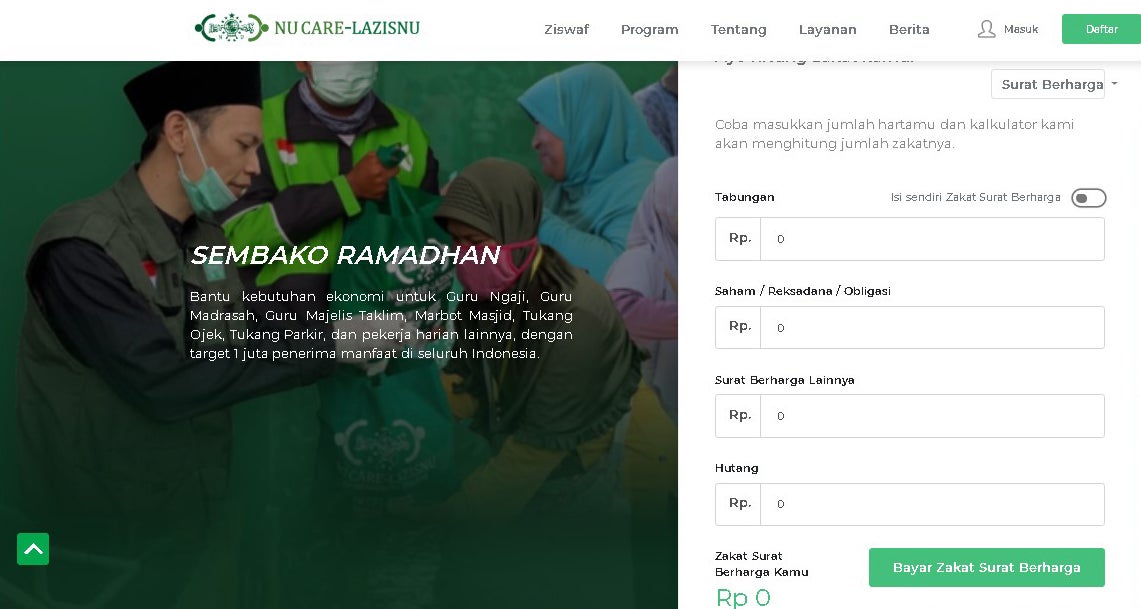
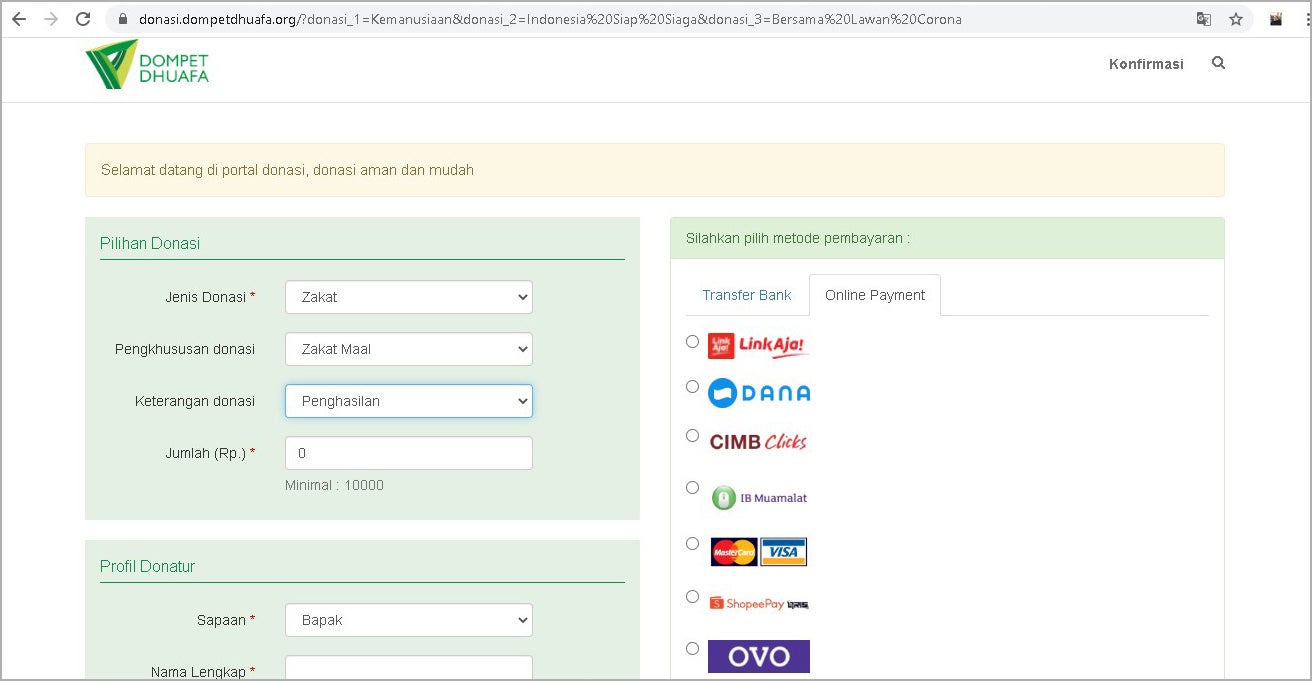
Examples of special donation webpages of Dompet Dhuafa and Lazisnu. Screenshots from https://donasi.dompetdhuafa.org/ and https://nucare.id/#
Opportunities and challenges to the online zakat collection
Large-scale social restrictions stopped the activities of some zakat organizations, especially those who relied on manual, offline collections. Some organizations (especially state-based zakat organizations) who did not have good capacities were inactive. However, this hindrance has pushed the majority of zakat organizations to go online and embrace innovation. For example, members of Zakat Forum who use zakat digital technology have increased to 87 percent compared to last year (when it was only 75 percent). Nana Sudiana, Secretary of FOZ, stated that zakat organizations had no choice but to switch to online zakat collection. My small survey found that 50 percent of organizations intensified their online zakat activities and other online initiatives (such as webinars, online concerts, social media promotions) because of the pandemic.
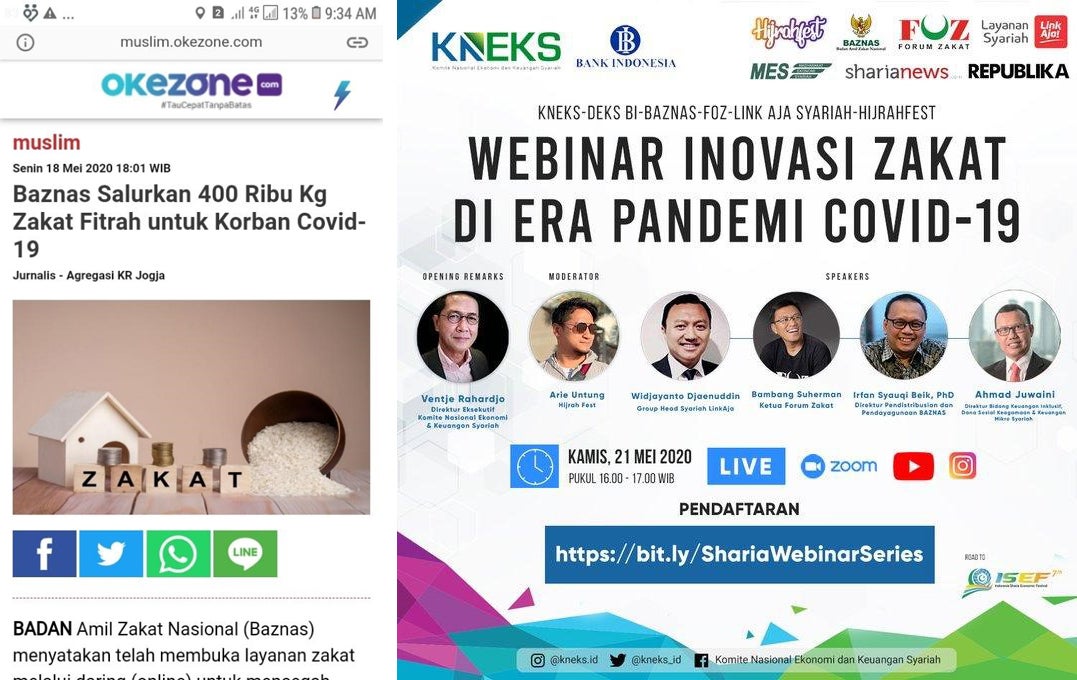
Sources: https://muslim.okezone.com/read/2020/05/18/614/2216022/baznas-salurkan-400-ribu-kg-zakat-fitrah-untuk-korban-covid-19 and https://pbs.twimg.com/media/EYeDp9FVAAIz3Gv?format=jpg&name=small
The reception of online zakat is not a novel strategy for some organizations, specifically for non-state organizations that were established by the younger generation after 1998. Information technology tools, such as websites, blogs, social media, have become significant ‘bridges’ to online zakat reception. The big zakat organizations offer various ways for zakat payment ranging from bank transfer to credit cards, PayPal, QR code, to crowdfunding, e-wallet, and Zakat Apps.
It seems there is neither a big theological nor jurisprudential problem in receiving zakat online, even for traditionalist Muslims. LAZISNU, a zakat organization under the Nahdlatul Ulama (NU), not only has had zakat online (see the images above, showing zakat on stocks), and a ‘e-wallet’ called ‘NUcash’, but also, during this Ramadhan they accepted zakat in the form of bitcoins!
Abdurrauf, an Executive Director of LAZISNU expressed that the income from online zakat increased from 35 percent last year to 90 percent. “Online zakat during this pandemic becomes the main option for us” (interview, 28 May 2020).
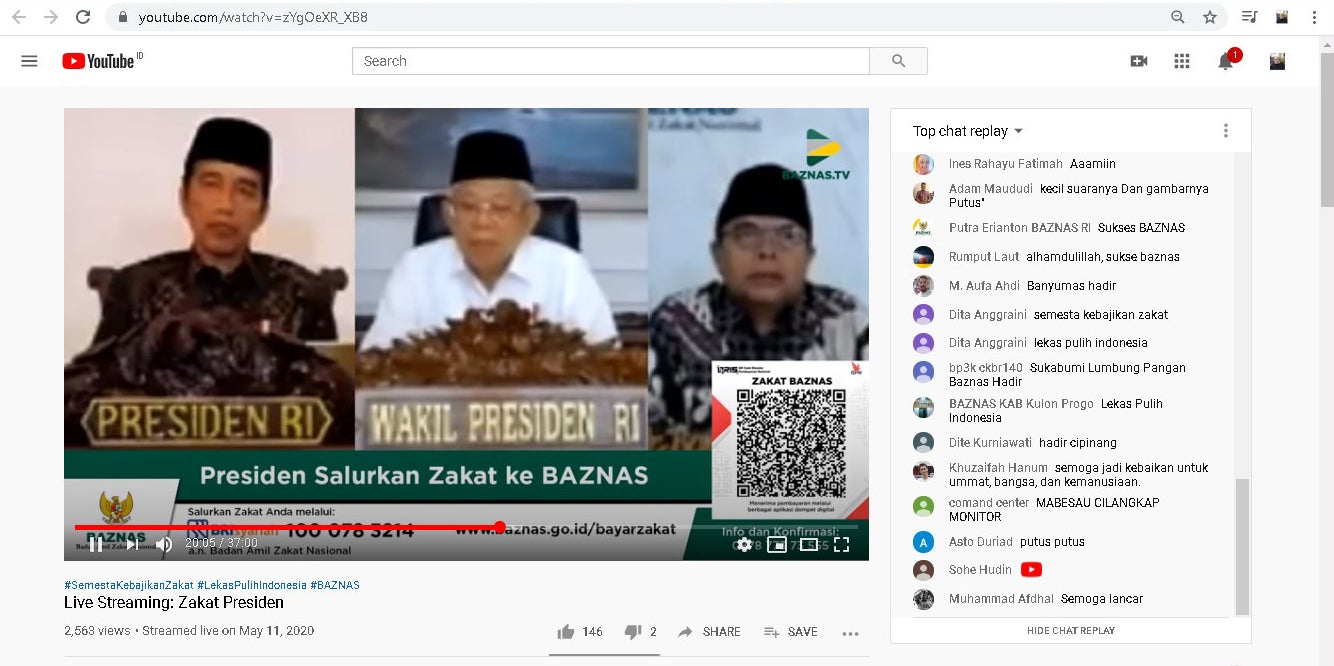
Source: President and vice president (followed by high officials) paid their zakat through online payment to BAZNAS. And the zakat payment is done via life streaming. Credit: https://www.youtube.com/watch?v=zYgOeXR_XB8
Muslim response to the innovation of zakat organizations
Before Ramadhan, religious authorities, such as the Minister of Religious Affairs and Indonesian Ulama Council, pleaded the Muslim population to accelerate their zakat payment in March and April to help the people affected by COVID-19. As seen above, fundraising from zakat organizations was a success. About 28 percent of their leaders assume that the increase is due to a combination of fundraising zakat and COVID-19. The majority of them (88 percent) believe that the appeals from the religious authorities have brought a significant impact in persuading Muslims to pay their zakat earlier. Therefore, in the first and second week of Ramadhan, 44 percent of them could redistribute zakat fitrah among the needy, while 55 percent of them distributed zakat maal to help those impacted by COVID-19.
Dompet Dhuafa and BAZNAS are among the organizations that have many COVID-19 programs. For instance, they provide disinfectant, personal protective equipment, hazmat suits for medical personnel, and basic grocery items. Besides that, BAZNAS distributed 400 kilograms of rice to the poor families who got most affected by COVID-19 in the beginning of Ramadhan.
However, not all Muslims could pay zakat online. About 235 million Muslims, with 44 percent of them living in rural areas, or those who do not have financial access to online banking, paid zakat fitrah via local zakat collectors and mosque managers, while trying to comply with all hygienic and safety procedures--wearing face masks, maintaining social distance, and avoiding hand shaking.
The COVID-19 pandemic has forced zakat organizations to use digital technology in organizational management, such as using zoom for meetings, replacing seminars with webinars, and using digital means for the collection and disbursement of zakat. It seems that with the financial inclusion and demographic change of the population, online zakat will grow. While the Indonesian government is planning to ease large-scale social restrictions step by step, will zakat organizations maintain their new work style? Will online zakat become part or the new normal? The majority of my interviewees said that they will continue to use these new virtual strategies caused by COVID-19, as they could consolidate into a good tradition for their organizations.
Amelia Fauzia is Professor and Head of Magister Program in Islamic History and Civilization, Faculty of Arts and Humanities, Syarif Hidayatullah Islamic University, Jakarta. She is also Director of Social Trust Fund (STF) UIN Syarif Hidayatullah Jakarta.
Disclaimer: The views and opinions expressed in this article are those of the authors and do not necessarily reflect the position of the blog editorial team or the Asia Research Institute.
South Asia | Southeast Asia | East Asia | Other Places | Hinduism | Buddhism | Islam | Christianity | Other Religions

